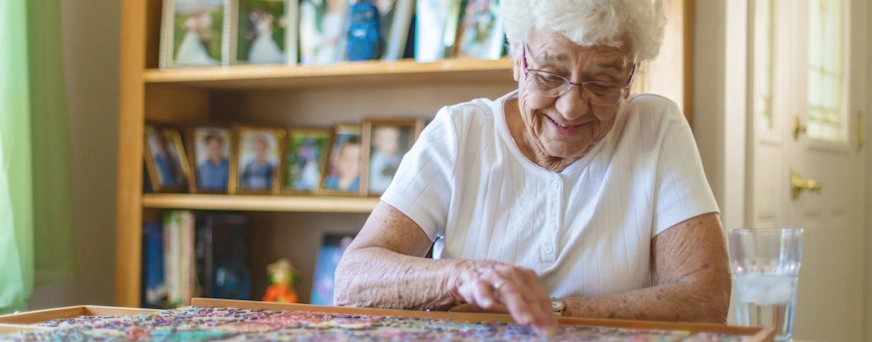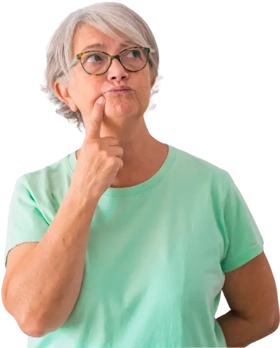Games for Seniors That Boost Memory and Mental Sharpness
Our Key Takeaway
Memory games like Sudoku, crosswords, Scrabble, chess, card matching, bingo, jigsaw puzzles, and trivia strengthen recall, focus, and problem-solving for Canadian seniors. These simple activities boost mental sharpness, lift mood, and support confidence and independence in daily life.
Most people in Canada notice aging affects their brains at some point. Memory may feel less reliable, and multitasking may not be easy anymore. Although your brain isn’t a muscle, exercise can delay cognitive decline in healthy aging.
Playing memory games gives Canadian seniors a simple, fun workout for thinking. These games spark your mind, lift your mood, and build everyday memory skills.
You may feel more independent, focus better, and understand things faster. Coordination and motor skills will also improve, making daily tasks feel easier and safer.
So now, let’s explore the best brain-boosting games for seniors that will not only sharpen their memory but also help them stay active.
Life Assure Product Quiz
Take our 30 second quiz and discover which Life Assure medical alert device is the right fit for you or a loved ones.
Life Assure Product Quiz
Take our 30 second quiz and discover which Life Assure medical alert device is the right fit for you or a loved ones.
Top 8 Brain-Boosting Games for the Elders

The following games fit everyday Canadian life and help keep the aging mind sharp.
Sudoku
Sudoku trains focus, working memory, and calm problem-solving under light pressure. You scan rows and columns, hold numbers in mind, and test options. That little loop strengthens attention and mental flexibility in a steady, friendly way.
In Canada, large-print books with sudoku inside feel perfect on long winter afternoons. Apps with zoom and gentle hints also help when aging eyes feel tired. In addition, timed modes nudge processing speed without making you rush.
Start with a small grid beside your morning coffee, then another at dusk. Over days, you’ll spot patterns faster, remember placements longer, and feel clearer.
The quiet challenge builds confidence, and the wins add up quickly. It’s simple, portable, and kind of soothing for aged adults.
Crossword Puzzles
Crosswords work language, clue reasoning, and long-term memory of names and facts. You need to pull words from storage, match them to letter shapes, and confirm fits. That search lights up memory pathways and keeps vocabulary lively and nimble.
However, start with easy community paper grids if big puzzles feel heavy. Also, try bilingual clues to stretch English and French at a comfortable pace.
A daily crossword builds rhythm, and recall grows smoother each week. You answer faster in conversations, remember appointments, and find the right word sooner. In addition, group crossword time at the seniors centre adds laughs and support, which feels social as well as brainy.
Scrabble
Scrabble blends memory, strategy, and quick math at a cozy kitchen table. You remember short words, plan hooks, and track which tiles might still appear. That mix trains working memory and strengthens planning without hard pressure.
Score counting, however small, keeps number sense awake and steady in Canadian seniors. Also, friendly games at the local seniors centre bring smiles and gentle rivalry. High-contrast boards and larger tiles help aging eyes on dark winter evenings.
In addition, team play pairs new players with experienced friends for warm guidance. You leave sharper with language, quicker with sums, and happy with small wins. Thus, it’s everyday brain training that fits around tea, soups, and family visits.
Chess
Chess sharpens planning, attention, and flexible thinking over quiet, thoughtful moves. You picture the board, test ideas in your head, then choose a line. That mental rehearsal builds working memory and good control of impulses.
If mobility is limited, online boards connect you from Halifax to Calgary. Also, try “mate in two” puzzles when time is short but focus is high. Accessible sets with large pieces support grip strength and easy square reading.
Over time, you read positions faster and avoid slip-ups more often. In addition, regular play steadies nerves and encourages patience in daily life. It’s classic, calm, and surprisingly warm on a chilly Canadian evening.
Card Matching
Card Matching, often called Concentration, trains visual memory and fast attention in aged adults. You flip two cards, note their spots, and hold locations in mind. That simple loop strengthens recall and teaches efficient scanning across the table.
Use big, high-contrast picture decks for comfort under indoor lighting. Make custom decks with family photos or Canadian landmarks to add meaning. Also, keep rounds short so your brain works hard without feeling worn out.
Play solo for quiet practice or with grandkids for bright weekend energy. In addition, the turn-taking rhythm improves patience and light motor control in aging brains. It feels playful, low-stress, and genuinely helpful during everyday Canadian routines.
Bingo
Bingo looks like luck, yet it trains listening, scanning, and quick reactions in the elderly. You track the caller, sweep the card, and act without losing place. That routine supports processing speed and sustained attention in a friendly setting.
However, pattern bingo adds challenge with shapes beyond simple straight lines. Also, try “math bingo,” where called numbers become tiny sums for extra thinking. Choose bold cards with big fonts, and keep a dabber that fits your grip.
Regular games lift mood, build social ties, and sharpen reaction time. In addition, the group energy helps you stay present and alert longer. It’s a community, a laugh, and brain practice, all on one bright card.
Jigsaw Puzzles

Jigsaws train spatial sense, hand-eye coordination, and organized, patient thinking. You sort edges, group colours, and remember where each texture likely belongs. This steady flow strengthens visual memory while calming the nervous system.
Use puzzle mats so you can roll up progress between meals or visits. Also, pick larger pieces if fingers feel stiff on colder mornings. Work with a friend to talk through shapes and share each small win.
You soon start to scan faster, place pieces with confidence, and feel deep focus. It’s art, memory training, and a gentle workout for steady elderly hands.
Trivia Quizzes
Trivia wakes up long-term memory, speed of recall, and flexible thinking. You reach for facts, pull them up fast, and link them to clues. That action strengthens memory access, which helps names and dates stick better.
You can join the trivia quiz sessions conducted in the library or café nights in Toronto, Winnipeg, or Victoria. However, play in teams so that the pressure stays low while learning stays lively.
Short daily quizzes on a phone app can keep things light between errands. You’ll feel quicker in conversation and sharper during form fill-ups, calls, and appointments. In addition, regular quizzing builds confidence for speaking up in groups.
Conclusion
You can keep your mind lively with simple games across Canada today. Sudoku, crosswords, and cards are some of the most effective games for seniors that build their memory, focus, and steady thinking over the years.
You also feel brighter, move smoothly, and handle daily tasks more easily. So, choose two games this week, practice often, and enjoy sharper mental days.











 Get Help With The Push Of A Button
Get Help With The Push Of A Button














